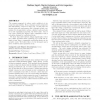Free Online Productivity Tools
i2Speak
i2Symbol
i2OCR
iTex2Img
iWeb2Print
iWeb2Shot
i2Type
iPdf2Split
iPdf2Merge
i2Bopomofo
i2Arabic
i2Style
i2Image
i2PDF
iLatex2Rtf
Sci2ools
108
click to vote
CF
2005
ACM
2005
ACM
Skewed caches from a low-power perspective
The common approach to reduce cache conflicts is to increase the associativity. From a dynamic power perspective this associativity comes at a high cost. In this paper we present miss ratio performance and a dynamic power comparison for set-associative caches, a skewed cache and also for a new organization proposed, the elbow cache. The elbow cache extends the skewed cache organization with a relocation strategy for conflicting blocks. We show that these skewed designs significantly reduce the conflict problems while consuming up to 56% less dynamic power than a comparably performing 8-way set associative cache. We believe this to be the strongest case in favor of skewed caches presented so far. Categories and Subject Descriptions: B.3.m [Memory Structures]: Miscellaneous General Terms: Performance
| Added | 13 Oct 2010 |
| Updated | 13 Oct 2010 |
| Type | Conference |
| Year | 2005 |
| Where | CF |
| Authors | Mathias Spjuth, Martin Karlsson, Erik Hagersten |
Comments (0)

